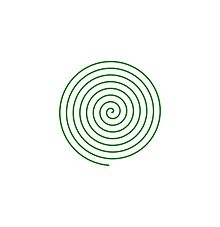| This article includes a list of references, related reading, or external links, but its sources remain unclear because it lacks inline citations. Please help improve this article by introducing more precise citations. (January 2019) (Learn how and when to remove this message) |




In geometry, a spirangle is a spiral polygonal chain. Spirangles are similar to spirals in that they expand from a center point as they grow larger, but they are made out of straight line segments, instead of curves. Spirangle vectographs are used in vision therapy to promote stereopsis and help resolve problems with hand–eye coordination.
Two-dimensional spirangles
A two-dimensional spirangle is an open figure consisting of a line bent into angles similar to a corresponding polygon. The spirangle can start at a center point, or a distance from the center, and has some number of turns around the center point.
Three-dimensional spirangles
Three-dimensional spirangles have layers that slant upward, progressively gaining height from the previous segment. This is similar to staircases in large buildings that turn at the top of each flight. The segments also may progressively lose an amount of length and resemble a pyramid.
Uses
- Ophthalmology — vectograms
- Electronics — printed inductors
- Architecture — ‘spiral’ staircases
- Jewelry — earrings, pendants
- Search algorithms — optimal scanning of a region of interest, for example a crime scene or a region of the celestial sphere
See also
References
- Michael Scheiman & Bruce Wick (2013) Clinical Management of Binocular Vision, pp. 216, 256, 272, Wolters Kluwer, Fourth edition, ISBN 978-1451175257.
- Jaime Aquilera & Roc Berenquer (2007) Design and Test of Integrated Inductors for RF Applications, p. 24, Springer Science & Business Media ISBN 978-0470025871.
External links
| Spirals, curves and helices | |||
|---|---|---|---|
| Curves |  | ||
| Helices |
| ||
| Spirals | |||